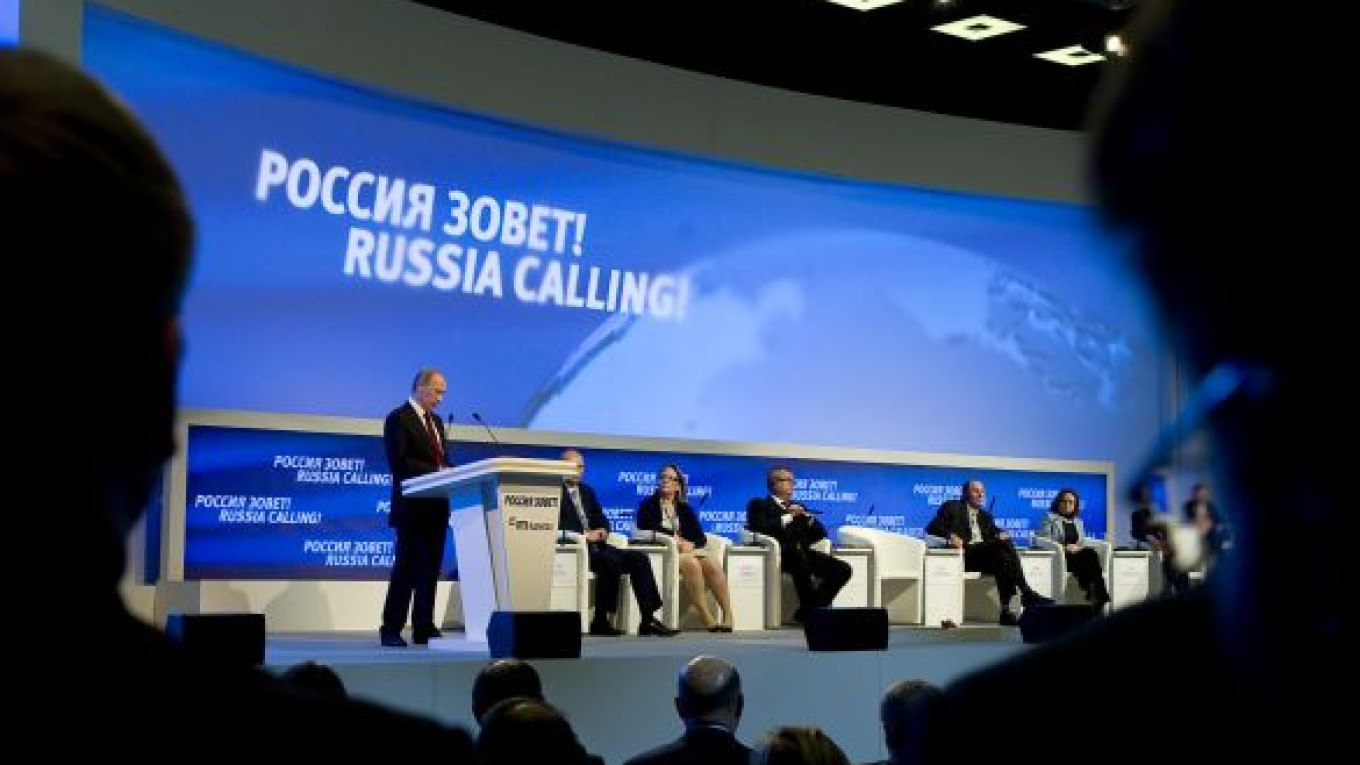Prime Minister Vladimir Putin on Thursday attempted to reassure investors dismayed by swelling social and military spending and promised a slate of major high-tech projects and more liberal rules for buying into strategic resource companies.
He also addressed fears of political stagnation that could accompany his likely return to the Kremlin after the presidential election in March, saying there would be gradual changes.
Fiscal discipline will remain a "cornerstone" for the government after the upcoming election, Putin said during his first appearance before investors after announcing the Kremlin bid.
"We have made careful calculations and believe that revenues will be enough … for those large and complex issues in the area of education, health care and defense," he said, fielding questions after his keynote speech at an investment conference.
Alexei Kudrin, the thrifty? former finance minister, will remain part of decision making, even after his public spat with President Dmitry Medvedev over defense spending, Putin added. "He is, no doubt, one of the best specialists not only in Russia but also the world," Putin said. "He is a friend of ours and a personal friend of mine."
He spoke after approving a federal budget that is more dependent on the volatile oil price than most previous budgets on record. At the conference, Putin said it was "conservative" for the government to assume that Russian crude — the key revenue earner — would cost $100 next year, even as the global economy slowed down.
Putin said the government would seek to clear the way for "thousands" of new projects and ideas to wean the economy off its reliance on oil and gas. In addition, "we intend to implement large projects in bio- and nanotechnology, telecommunications, energy efficiency and outer space to create a whole network of powerful high-tech companies in Russia," he said at the conference organized by state-controlled bank VTB. "We need investment for that."
Even so, Putin indicated that more investment was welcome for resource companies as well. In a sign of the need, he announced that the government had submitted an amendment to the State Duma on Wednesday to allow foreign investors to buy stakes of up to 25 percent in strategic resource companies without permission from a special government commission. The current threshold is 10 percent.
But Putin spent most of the time reiterating many highlights of his previous speeches — most recently at the United Russia Convention and the Sochi Investment Forum last month. The usual pronouncements included the relatively small sovereign debt, the record low growth of consumer prices so far this year and a dig at the euro zone's debt problems. He danced around the official expectations that capital flight from Russia will amount to $50 billion this year.
"Putin has been saying the same for quite a while," said Ovanes Oganisyan, a strategist at Renaissance Capital. "It's general phrases and predictable answers."
He said Putin, a master of consensus-based decisions, was unlikely to announce any drastic economic policy changes after the elections either.
While also advocating political stability as a measure to draw investment, Putin said it did not mean the system was cast in stone. "No doubt, there is a need for changes," he said. "And they will take place, but it will be an evolutionary path."
"We don't need great upheavals, we need a great Russia!" he exclaimed.
Asked about Russia's bid to join the WTO, Putin, who is often described as skeptical about the idea, supported entry, saying it was a net positive. The single major obstacle, Putin said, was now to win the consent of WTO member Georgia, which fought a brief war with Russia in 2008.
Putin suggested that the United States and European Union — if they really supported Russia's accession — could convince Georgia to remove its demands, which are related to its breakaway regions that have Russia's backing.
In an answer to another question, Putin said Russia at some point could remove Gazprom's monopoly on natural gas exports. He noted that the recent raids on Gazprom's offices in the EU were probably meant as a push in that direction, admitting that competition among local gas exporters would lead to more sales but lower prices.
A Message from The Moscow Times:
Dear readers,
We are facing unprecedented challenges. Russia's Prosecutor General's Office has designated The Moscow Times as an "undesirable" organization, criminalizing our work and putting our staff at risk of prosecution. This follows our earlier unjust labeling as a "foreign agent."
These actions are direct attempts to silence independent journalism in Russia. The authorities claim our work "discredits the decisions of the Russian leadership." We see things differently: we strive to provide accurate, unbiased reporting on Russia.
We, the journalists of The Moscow Times, refuse to be silenced. But to continue our work, we need your help.
Your support, no matter how small, makes a world of difference. If you can, please support us monthly starting from just $2. It's quick to set up, and every contribution makes a significant impact.
By supporting The Moscow Times, you're defending open, independent journalism in the face of repression. Thank you for standing with us.
Remind me later.


